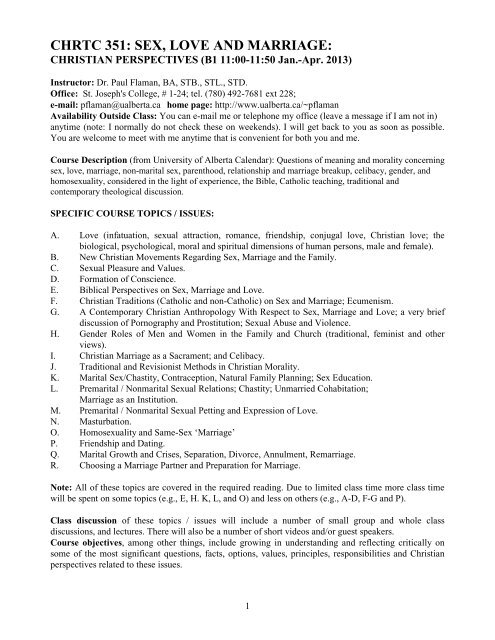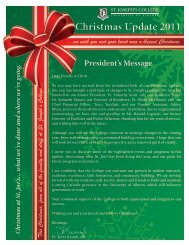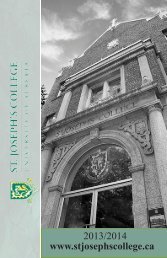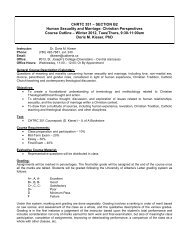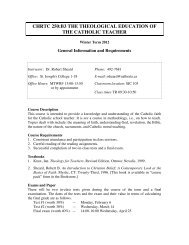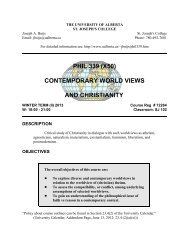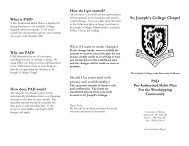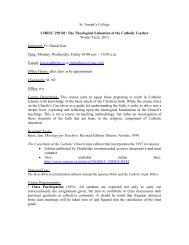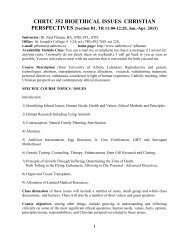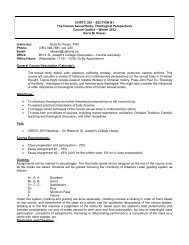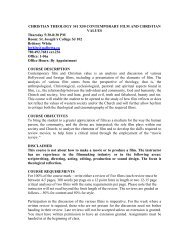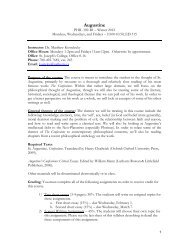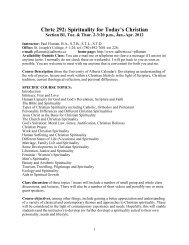chrtc 351: sex, love and marriage - St. Joseph's College - University ...
chrtc 351: sex, love and marriage - St. Joseph's College - University ...
chrtc 351: sex, love and marriage - St. Joseph's College - University ...
You also want an ePaper? Increase the reach of your titles
YUMPU automatically turns print PDFs into web optimized ePapers that Google loves.
CHRTC <strong>351</strong>: SEX, LOVE AND MARRIAGE:CHRISTIAN PERSPECTIVES (B1 11:00-11:50 Jan.-Apr. 2013)Instructor: Dr. Paul Flaman, BA, STB., STL., STD.Office: <strong>St</strong>. <strong>Joseph's</strong> <strong>College</strong>, # 1-24; tel. (780) 492-7681 ext 228;e-mail: pflaman@ualberta.ca home page: http://www.ualberta.ca/~pflamanAvailability Outside Class: You can e-mail me or telephone my office (leave a message if I am not in)anytime (note: I normally do not check these on weekends). I will get back to you as soon as possible.You are welcome to meet with me anytime that is convenient for both you <strong>and</strong> me.Course Description (from <strong>University</strong> of Alberta Calendar): Questions of meaning <strong>and</strong> morality concerning<strong>sex</strong>, <strong>love</strong>, <strong>marriage</strong>, non-marital <strong>sex</strong>, parenthood, relationship <strong>and</strong> <strong>marriage</strong> breakup, celibacy, gender, <strong>and</strong>homo<strong>sex</strong>uality, considered in the light of experience, the Bible, Catholic teaching, traditional <strong>and</strong>contemporary theological discussion.SPECIFIC COURSE TOPICS / ISSUES:A. Love (infatuation, <strong>sex</strong>ual attraction, romance, friendship, conjugal <strong>love</strong>, Christian <strong>love</strong>; thebiological, psychological, moral <strong>and</strong> spiritual dimensions of human persons, male <strong>and</strong> female).B. New Christian Movements Regarding Sex, Marriage <strong>and</strong> the Family.C. Sexual Pleasure <strong>and</strong> Values.D. Formation of Conscience.E. Biblical Perspectives on Sex, Marriage <strong>and</strong> Love.F. Christian Traditions (Catholic <strong>and</strong> non-Catholic) on Sex <strong>and</strong> Marriage; Ecumenism.G. A Contemporary Christian Anthropology With Respect to Sex, Marriage <strong>and</strong> Love; a very briefdiscussion of Pornography <strong>and</strong> Prostitution; Sexual Abuse <strong>and</strong> Violence.H. Gender Roles of Men <strong>and</strong> Women in the Family <strong>and</strong> Church (traditional, feminist <strong>and</strong> otherviews).I. Christian Marriage as a Sacrament; <strong>and</strong> Celibacy.J. Traditional <strong>and</strong> Revisionist Methods in Christian Morality.K. Marital Sex/Chastity, Contraception, Natural Family Planning; Sex Education.L. Premarital / Nonmarital Sexual Relations; Chastity; Unmarried Cohabitation;Marriage as an Institution.M. Premarital / Nonmarital Sexual Petting <strong>and</strong> Expression of Love.N. Masturbation.O. Homo<strong>sex</strong>uality <strong>and</strong> Same-Sex ‘Marriage’P. Friendship <strong>and</strong> Dating.Q. Marital Growth <strong>and</strong> Crises, Separation, Divorce, Annulment, Re<strong>marriage</strong>.R. Choosing a Marriage Partner <strong>and</strong> Preparation for Marriage.Note: All of these topics are covered in the required reading. Due to limited class time more class timewill be spent on some topics (e.g., E, H. K, L, <strong>and</strong> O) <strong>and</strong> less on others (e.g., A-D, F-G <strong>and</strong> P).Class discussion of these topics / issues will include a number of small group <strong>and</strong> whole classdiscussions, <strong>and</strong> lectures. There will also be a number of short videos <strong>and</strong>/or guest speakers.Course objectives, among other things, include growing in underst<strong>and</strong>ing <strong>and</strong> reflecting critically onsome of the most significant questions, facts, options, values, principles, responsibilities <strong>and</strong> Christianperspectives related to these issues.1
COURSE REQUIREMENTS:A. Readings: The following reading materials for this course will be sold through the <strong>University</strong> of AlbertaBookstore:1) Premarital Sex <strong>and</strong> Love: In the Light of Human Experience <strong>and</strong> Following Jesus (Edmonton:McCallum Printing Group Inc., 1999) by Paul Flaman; <strong>and</strong>2) <strong>St</strong>udent Course Pack: SUPPLEMENTARY READINGS for CHRTC <strong>351</strong> B1 (Winter 2013) Sex, Love <strong>and</strong>Marriage: Christian Perspectives, Instructor: Dr. Paul Flaman.Note: The above include both required <strong>and</strong> recommended readings. More information specifyingthe required readings from the above, as well as discussion questions <strong>and</strong> possible examquestions, for the specific course topics / issues will be h<strong>and</strong>ed out during the first 2 weeks of classes.B. Reading Responses (two), worth 2.5% each for a total of 5 %, 150-250 words each, on the followingarticles/chapters in the Course Pack: “Fool’s Gold: Holy Sex or Eroticism,” pp. 71-78 (due Fri. 1 Feb.2013); <strong>and</strong> “Mutuality in Sexual Pleasure as Normative,” pp. 123-33 (due Fri. 8 Mar. 2013). Some moredetails concerning these responses will be distributed the first week of classes (see p. 5 of the coursesyllabus).C. Mid-term Examination, worth 20 % of the course mark, 1100-1150 Fri. 1 Mar. 2013, written "closedbook",from topics given in advance related to the required readings <strong>and</strong> class material up to the mid-term.D. Research <strong>and</strong> Reflection Paper on a topic related to the course: worth 25 % of the course mark, 1600-2000 words plus references, due Wed. 20 Mar. 2013, beginning of class. More specific guidelines,expectations <strong>and</strong> marking criteria regarding this assignment are available from the instructor <strong>and</strong> will bedistributed during the first week of classes (see pp. 3-4 of the course syllabus).E. Class Participation: worth 10 % of course mark. 7/10 of this mark will be related to participating insmall group class discussions. The other 3/10 of this mark will be related to your involvement in whole classdiscussion including the E-Class / Moodle on-line discussion forum/tool for this class <strong>and</strong>/or other means ofcontributing to the class such as providing the instructor with relevant web sites, articles, etc.Note: The percentage for missed term work will not be transferred to the final examination. If you miss themidterm exam, e.g., because of illness, see me as soon as possible.F. Final Examination: worth 40% of the course mark, time <strong>and</strong> day determined by the university, scheduledfor Fri. 19 Apr. 2013, 0900-1100 (in the class room), written "closed-book", from topics given in advancerelated to the assigned readings <strong>and</strong> class material for the whole course.Note: If you have any questions concerning this course <strong>and</strong>/or course outline you are most welcome totelephone or e-mail me or come <strong>and</strong> see me (see number <strong>and</strong> addresses above). More information regardinggrading, cheating <strong>and</strong> plagiarism will be distributed the first week of classes. “Policy about course outlines can befound in § 23.4(2) of the <strong>University</strong>’s Calendar.” (GFC 29 SEP 2003)2
Chrtc <strong>351</strong> (Flaman) Research <strong>and</strong> Reflection Paper Guidelines (see p. 2, D above)This assignment is meant to be a student-centered active learning experience. Allowing you to choose your owntopic of research <strong>and</strong> reflection allows you to choose a topic that is especially interesting <strong>and</strong> relevant to you.The paper must be on a topic related to the course, 1600-2000 words plus references to the sources you use(typed, double-space text, use 12 point font). If you wish to write a longer essay for your own purposes pleaseindicate which part you wish evaluated for this course. The essay must be theological (Consider any relevantbiblical <strong>and</strong>/or Church teaching concerning your topic, as well as two or more scholarly theological sources otherthan the required reading materials. At least two of these must be written <strong>and</strong> published 1970 or later). Atheological source includes God <strong>and</strong>/or religious faith in discussing issues. Your essay may also integratematerial from other disciplines that is relevant to your topic (e.g. psychology, sociology, anthropology, biology<strong>and</strong>/or philosophy, etc.). You may not h<strong>and</strong> in an essay from another course or an essay written by someone else.Show sufficient research (although you may use required reading materials, you must show signs of using at leastthree scholarly sources (i.e. published in a scholarly book or journal) other than the required readings, butprobably not more than eight) <strong>and</strong> properly acknowledge your sources (follow one st<strong>and</strong>ard academic formatconsistently; see, e.g.: The Chicago Manual of <strong>St</strong>yle or www.wisc.edu/writing/H<strong>and</strong>book/), giving page orsection numbers for quotations <strong>and</strong> specific references (e.g. names, ideas, statistics or other information).Regarding biblical references, give in abbreviated form the appropriate book, chapter <strong>and</strong> verses, e.g., 1 Cor 7:2-9- indicate the translation of the Bible that you use in your notes or reference list.Although your essay should be primarily a research paper, it should not be only a summary of other writers'thoughts or a compilation of quotations. It should include some of your own analysis, insights <strong>and</strong> personalconclusions (250 words or more) relevant to your topic. Read to become informed on your topic, think, pray <strong>and</strong>organize your own essay. You may choose to write on any topic related to the course. You may also consider theteaching or position of some Christian Church other than the Catholic Church with respect to a topic related tothe course. Or, you may compare a non-Christian religious view(s) with a Christian view(s) of a topic related tothe course. Be fair to your sources (e.g., if you disagree with a certain writer's view do not exaggerate or distorthis or her position - try to underst<strong>and</strong> what he or she actually meant to say in the context) <strong>and</strong> present yourinsights in a clear <strong>and</strong> balanced way.Reference materials such as a good concordance or dictionary of the Bible <strong>and</strong> a good encyclopedia (e.g. theNew Catholic Encyclopedia) or dictionary of theology are often good places to begin theological research.Regarding using the Bible in an academic assignment, it is advisable to use a good biblical commentary tofamiliarize yourself with the context <strong>and</strong> common scholarly interpretations of any biblical text(s) to which youmay wish to refer. See also the note regarding bibliography below.For additional criteria regarding the marking of your essay see the "Marking Guide" on the other side of thissheet. Attach this marking guide face up after the last page of your essay. Keep a copy (at least on disk) <strong>and</strong> h<strong>and</strong>in the original of your essay.If you have any questions or problems concerning this assignment, you are welcome to discuss them with me.Late Penalty: If the essay is h<strong>and</strong>ed in late, one mark out of 50 will be docked for each day late (notincluding weekends or holidays). Extensions without penalty will be granted only by notifying the instructor <strong>and</strong>only for a serious reason beyond your control such as serious illness. An essay not h<strong>and</strong>ed in at all will receivezero out of 50. The essay will not be accepted after the final examination without proper written universityauthorization.Bibliography: With regard to theological (<strong>and</strong> philosophical) sources <strong>St</strong>. <strong>Joseph's</strong> <strong>College</strong> Library, downthe East stairway of <strong>St</strong>. <strong>Joseph's</strong> <strong>College</strong>, aims to have adequate resources to serve its students. Its librarians arevery willing to serve you. Among other resources which may be helpful for your research, the Catholic Periodical<strong>and</strong> Literature Index is on the Computer CD-Rom Workstation (the print edition to the end of 2002 is also in thelibrary). <strong>St</strong>. <strong>Joseph's</strong> <strong>College</strong> Library holdings, as well as the library holdings of a number of other Christiancolleges in the Edmonton area, are online through NEOS/GATE. See the <strong>University</strong> of Alberta Libraries webpage (www.library.ualberta.ca/). For many sources specifically related to the course contents see the sourcesreferred to in the course’s required readings. There are many resources, including theological resources, onhuman <strong>sex</strong>uality, <strong>marriage</strong> <strong>and</strong> family life in the Edmonton area <strong>and</strong> on the Internet (for some relevant links see:http://www.ualberta.ca/~stjoseph/library.htmlwww.ualberta.ca/~stjoseph/resource_pages/resourcelink.html <strong>and</strong> www.ualberta.ca/~pflaman/links.html ).3
Chrtc <strong>351</strong> Research <strong>and</strong> Reflection Paper Marking Guide (Paul Flaman)(<strong>St</strong>. <strong>Joseph's</strong> <strong>College</strong>, <strong>University</strong> of Alberta, Edmonton)Please attach this sheet face up to the back of your essay when you h<strong>and</strong> it in. Your essay will be evaluated infive areas as indicated.Comments1) research: sufficient usage _______ /25of appropriate academicsources, relevant information,fairly <strong>and</strong> accurately presented,essay is appropriate length...2) personal insights: re topic _______ /10<strong>and</strong> sources, writer attemptsto arrive at sound conclusions(theological/ethical/pastoral),reasons given, likely objectionsanswered, good analysis<strong>and</strong> underst<strong>and</strong>ing...3) writing skill: clear, _______ /7balanced, well-organized(introduction, paragraphing,conclusion), logical sequence,flows well, good transitions,interesting, good style...4) format: proper referencing _______ /5of sources (quotations,ideas, information), properformat re notes/bibliography,title page, subtitles, propermargins, spacing, page numbering...5) proper spelling, grammar, _______ /3punctuation...Total Mark: /50NB: 1: See the Guidelines (over) regarding expectations for the essay concerning content <strong>and</strong> format. Since thisis an academic paper in theology (i.e. a humanity's subject) do not use contractions, <strong>and</strong> write out numbers under100 in the body of the essay. Explain any abbreviations used.NB: 2: Besides the above general evaluations <strong>and</strong> comments, please note any specific check marks (re goodpoints), as well as comments <strong>and</strong> corrections regarding some ways of improving your essay.Marker: ________________________4
<strong>University</strong> of Alberta, <strong>St</strong>. Joseph’s <strong>College</strong> (Paul Flaman)Reading Responses (see p. 2, B above): These responses on two chapters from different books, which arerelevant to this course, are meant to help you hone two important writing skills–summarizing accurately <strong>and</strong>critiquing intelligently <strong>and</strong> fairly. They will also provide you with some feedback before you write your longerresearch <strong>and</strong> reflection paper, which is worth more marks. Please type (use 12 point font) <strong>and</strong> double-space yourresponses. Each response is to include a 75-125 word summary of the main themes in the related chapter, <strong>and</strong> a75-125 word response in which you share your own view regarding what the author has said. Provide somereasons for your view based, for example, on the experience of yourself or others, your values <strong>and</strong>/or faith.Responses longer than 250 words will not be accepted. Your responses should be clear, concise, substantive,balanced <strong>and</strong> well-written. Late Responses: The responses are due at the beginning of the related class (see p. 2,B above). Please do not h<strong>and</strong> them in, however, until we have discussed them as a whole class since I may askyou to read either your summary or view of the related chapter during our discussion of it. If any of yourresponses is h<strong>and</strong>ed in late, 5 percent of the total possible mark will be docked for each day late (not includingweekends or holidays). Extensions without penalty will be granted only by notifying the instructor <strong>and</strong> only for aserious reason beyond your control such as serious illness. A response not h<strong>and</strong>ed in at all will receive zero out of50. The reading responses will not be accepted after the final examination without proper written universityauthorization.Access to course evaluative material (GFC 18 June 2007): Copies of some of this course’s previous finalexaminations are available from the <strong>St</strong>udent’s Union Exam Registry. Consulting this exam registry, however,will be unnecessary since the questions on both the midterm <strong>and</strong> final examinations will be picked from a pool oftopics / questions given to you in advance (see p. 2 above).For information on Specialized Support <strong>and</strong> Disability Services see: http://www.uofaweb.ualberta.ca/SSDS/Grading: <strong>St</strong>udents in this course will be graded following the U. of A. Letter Grading System, as follows:Grading in Undergraduate CoursesDescriptor Letter Grade Point ValueExcellentGoodSatisfactoryPoorMinimal PassA+AA-B+BB-C+CC-D+DFailure F 04.04.03.73.33.02.72.32.01.71.31.0Under this system, marking <strong>and</strong> grading are done separately. Grading involves a ranking in order of merit basedon raw scores, an assessment of the class as a whole, <strong>and</strong> the qualitative descriptions of the various grades.Grading is in the first instance a judgment of the instructor based upon the student's total performance <strong>and</strong>5
includes consideration not only of marks earned for term work <strong>and</strong> final examination, but also of classparticipation, completion of assignments, a comparison of the class as a whole with other classes, etc. A predetermineddistribution of grades, e.g., a bell curve, is not used. Grades are subject to revision according toprocedures <strong>and</strong> policies of the Faculty of Arts.Academic Integrity, Cheating <strong>and</strong> Plagiarism:"The <strong>University</strong> of Alberta is committed to the highestst<strong>and</strong>ards of academic integrity <strong>and</strong> honesty. <strong>St</strong>udents are expected to be familiar with these st<strong>and</strong>ards regardingacademic honesty <strong>and</strong> to uphold the policies of the <strong>University</strong> in this respect. <strong>St</strong>udents are particularly urged tofamiliarize themselves with the provisions of the Code of <strong>St</strong>udent Behaviour (online at:http://www.governance.ualberta.ca/CodesofConduct<strong>and</strong>ResidenceCommunity<strong>St</strong><strong>and</strong>ards/Codeof<strong>St</strong>udentBehaviour.aspx) <strong>and</strong> avoid any behavior which could potentially result in suspicions of cheating, plagiarism,misrepresentation of facts <strong>and</strong>/or participation in an offence. Academic dishonesty is a serious offence <strong>and</strong> canresult in suspension or expulsion from the <strong>University</strong>."(GFC 29 SEP 2003) Since the examinations in this courseare closed-book, cheating constitutes any obtaining (or attempting to obtain) information from another student orany other unauthorized source (e.g. required reading materials or notes) during the exams, or using any othermethod of cheating. Plagiarism means to steal the ideas, words, images or data of another <strong>and</strong> pass them off asone's own without crediting the source (note the research assignment directives regarding properly referencingquotations <strong>and</strong> specific sources of information). Properly acknowledge all your immediate sources includingspeakers or interviews. No student shall submit in any course all or a substantial portion of any academic writing,essay, thesis, research report, project assignment, presentation or poster for which credit has been obtained by thestudent or which has been or is being submitted by the student in another course or program of the student in the<strong>University</strong> or elsewhere. A student who is caught cheating or plagiarizing a substantial part of one's assignmentwill receive nothing for that exam or assignment. The student will also be reported to the proper <strong>University</strong> ofAlberta authorities. See the Code of <strong>St</strong>udent Behavior regarding various penalties (30.4.2) including expulsion,<strong>and</strong> so forth. If one is having problems with an assignment or is excessively anxious about an examination, talk tothe instructor beforeh<strong>and</strong>. I will try to be reasonably flexible <strong>and</strong> fair.Deferred Exams: A deferred midterm exam will be granted at the discretion of the instructor on 14 Mar. 2013from 2:30-3:30 p.m. at a place determined by the instructor. <strong>St</strong>udents will be required to present acceptable proofof a valid reason for missing a scheduled midterm examination within two business days of the missedexamination, or as soon as the student is able. In the case of sickness, where a student chooses not to present amedical note, the student may be required to complete an Illness Declaration for Missed Examinations form,upon request by the instructor. <strong>St</strong>udents must see Hana Irving, Assistant to the Academic Dean, or Dr. BrianMaraj, at <strong>St</strong>. <strong>Joseph's</strong> <strong>College</strong> to fill out an Illness Declaration. The deferred final exam for this course will beheld on 15 May 2013 from 2-4 p.m. at a place determined by the instructor. <strong>St</strong>udents who need to write a deferredexamination must present adequate proof of their inability to attend to the student's Faculty Office, no later thantwo working days after the scheduled exam date or as soon as the student is able. In the event of absence due tosickness, a student may be required to swear a <strong>St</strong>atutory Declaration if they choose not to present a medical note.The fee for a deferred final exam is: $47.82, payable in advance. (Subject to change under calendar regulation§23.5).Reexamination: Information on reexamination policies is available in the <strong>University</strong> of Alberta's Calendar,23.5.5, or from the Arts Office. All students enrolled in <strong>St</strong>. <strong>Joseph's</strong> <strong>College</strong>'s courses <strong>and</strong> seeking reexaminationmust meet the criteria for eligibility of the Faculty of Arts <strong>and</strong>, if from another faculty, the criteria of their ownfaculty as well.6


